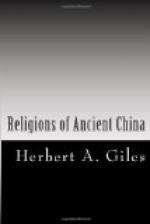Posthumous Honours for Confucius.—Before leaving Confucius, it is necessary to add that now for many centuries he has been the central figure and object of a cult as sincere as ever offered by man to any being, human or divine. The ruler of Confucius’ native State of Lu was profoundly distressed by the Sage’s death, and is said to have built a shrine to commemorate his great worth, at which sacrifices were offered at the four seasons. By the time however that the Chou dynasty was drawing to its close (third century B.C.), it would be safe to say that, owing to civil war and the great political upheaval generally, the worship of Confucius was altogether discontinued. It certainly did not flourish under the “First Emperor” (see post), and was only revived in B.C. 195 by the first Emperor of the Han dynasty, who visited the grave of Confucius in Shantung and sacrificed to his spirit a pig, a sheep, and an ox. Fifty years later a temple was built to Confucius at his native place; and in A.D. 72 his seventy-two disciples were admitted to share in the worship, music being shortly afterwards added to the ceremonial. Gradually, the people came to look upon Confucius as a god, and women used to pray to him for children, until the practice was stopped by Edict in A.D. 472. In 505, which some consider to be the date of the first genuine Confucian Temple, wooden images of the Sage were introduced; in 1530 these were abolished, and inscribed tablets of wood, in use at the present day, were substituted. In 555 temples were placed in all prefectural cities; and later on, in all the important cities and towns of the empire. In the second and eighth months of each year, before dawn, sacrifices to Confucius are still celebrated with considerable solemnity and pomp, including music and dances by bands of either thirty-six or sixty-four performers.
Mencius and Confucianism.—Mencius, who lived B.C. 372-289, and devoted himself to the task of spreading and consolidating the Confucian teachings, made no attempt to lead back the Chinese people towards their early beliefs in a personal God and in a spiritual world beyond the ken of mortals. He observes in a general way that “those who obey God are saved, while those who rebel against Him perish,” but his reference is to this life, and not to a future one. He also says that those whom God destines for some great part, He first chastens by suffering and toil. But perhaps his most original contribution will be found in the following paragraph:—
“By exerting his mental powers to the full, man comes to understand his own nature. When he understands his own nature, he understands God.”
In all the above instances the term used for God is T’ien. Only in one single passage does Mencius use Shang Ti:—“Though a man be wicked, if he duly prepares himself by fasting and abstinence and purification by water, he may sacrifice to God.”
Ch’u Yuan.—The statesman-poet Ch’u Yuan, B.C. 332-295, who drowned himself in despair at his country’s outlook, and whose body is still searched for annually at the Dragon-Boat festival, frequently alludes to a Supreme Being:—




